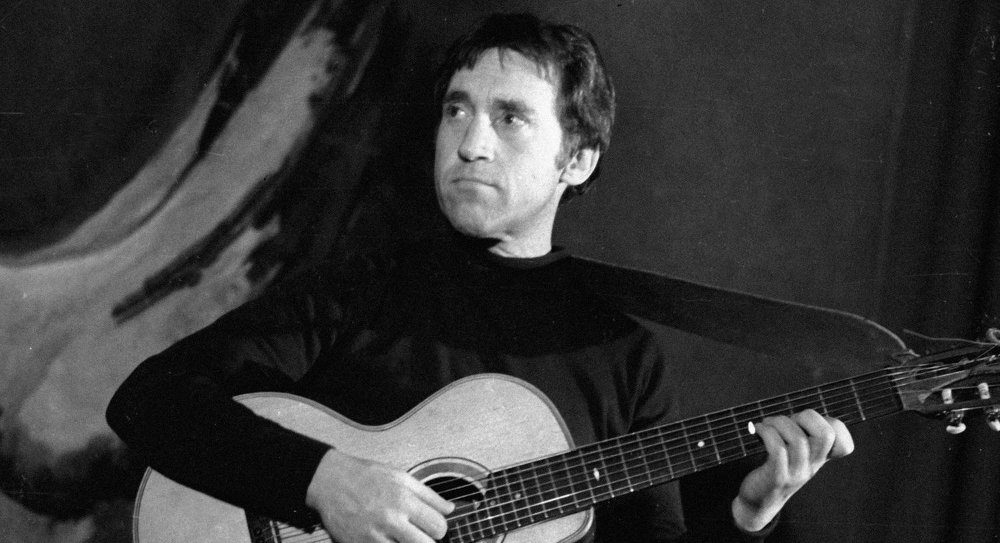Vladimir Vysotsky, whose songs spread like wildfire across the Soviet Union after they became available on tape, dreamed for years of releasing a vinyl LP in his home country. But his LPs were first released in France and Canada, and only later in the Soviet Union by Melodiya. Several years passed between when the Melodiya recordings were made and released, causing Vysotsky considerable distress. Tragically, he didn't live to see the release of the album he made with his beloved wife Marina Vlady.
Vladimir Vysotsky first showed up at the Anglican Cathedral on Stankevich Street (now Voznesensky Pereulok) that housed Melodiya in 1974. Already a popular singer-songwriter, Vysotsky was invited to write songs for a stage adaptation of Alice in Wonderland put on by his acting teacher, the theater director Oleg Gerasimov. This was at the height of the period referred to grimly as "stagnation" in the Soviet Union, when the slightest breeze in the culture felt like a powerful gust of wind. The idea of a popular singer like Vystosky, with his raucous voice and wry lyrics blending satire and allegory, working at Melodiya was provocative. In fact, Melodiya's producers had a hard time bringing Vysotsky on board. He wound up singing the songs himself, as they were written with his own unique voice in mind, not the smooth voices of professional singers. Vysotsky's songs are that the reason why this production of Alice in Wonderland was nearly banned after three years of work. It was a small miracle that the play was given the green light in the end.
While working on Alice, Vysotsky was allowed to record two LPs, one with Marina Vlady. The producers at Melodiya selected the most uncontroversial songs: romantic and humorous songs, songs about war. Melodiya's in-house orchestra, formed in 1973, featured the premier jazz musicians of Moscow, including virtuosos who used to play with the big band directed by Oleg Lundstrem and Vadim Lyudvikovsky, and was directed by saxophonist George Garanyan and trumpeter Vladimir Chizhik. They were charged with translating Vysotsky's adrenaline-fueled rhymes and chords into pop arrangements.
Notably, the orchestra's instrumentation was an exact replica of American jazz-rock group Blood, Sweat & Tears, which was popular at the time. The musicians themselves gravitated toward modern jazz and popular musical styles, which showed in Melodiya's own records. However, their day-to-day work consisted of performing more routine music. Six of the nine orchestra members were also composers who wrote the musical arrangements for the group.
"Vysotsky liked to get to know the people he played with personally," Melodiya pianist Boris Frumkin, now the director of the Oleg Lundstrem Jazz Orchestra, said. Vysotsky often invited Frumkin to his home, while Marina Vlady brought him records from France, which were almost worth their weight in gold at that time in the Soviet Union. A charismatic actor and singer, Vysotsky also quickly befriended Melodiya's saxophonist Alexei Zubov. There's a story that he urged Zubov to emigrate from the Soviet Union as soon as possible, which he ultimately did.
Vladimir Vysotsky insisted on having his album recorded the way they did in the 1930s-1950s, when singers sang along with the orchestra during recording sessions rather than using the standard overdub method. Having listened to earlier recordings by Melodiya, Vysotsky said, "We won't get anywhere with this. You lack my edge. We have to play together, so that you can hear me and I can hear you." According to Boris Frumkin, it was more difficult than most recording sessions. "We were used to listening to each other and playing crisply and cleanly," he said. "With Vysotsky we had to focus on the soloist. But it made sense, because it brought more energy to our performance."
What makes Vysotsky's recordings with Melodiya so special is that they feel like a friendly get-together with jokes and laughs and the occasional moment of silent reflection on something important that was said. At first, it sounds like a one-man show: the enveloping power of Vysotsky's voice makes the accompaniment sound minimalist by comparison. But the more you listen to it, you begin to appreciate how important the collaboration is. In the humorous songs, the accompaniment is full of playfulness and musical humour, particularly the piano of Boris Frumkin, who, in his own words, "did his best to be funny for Vysotsky." Just listen to his whimsical playing on "Moscow-Odessa." In Vyotsky's existential "anxiety songs" (as he called them), in which he reduces himself to ashes in a blaze of emotion, the orchestra manages to hang back while keeping the accelerated tempo that was so typical of Vysotsky's music, acting and life in general. The intensity reaches its climax in "Koni Priveredlivye" (Fussy Horses), a song that has come to define Vysotsky's legacy and biography. Vystosky's voice cuts off abruptly at the end of the song, as if self-destructing in front of us, while Melodiya's spirited rhythm section gallops on without the fallen rider.
Still, Vladimir Vysotsky's songs sound best accompanied by nothing more than his rebellious guitar, which lays bare the emotion and the meaning of the music. Any extraneous instruments sound contrived, and only conceal the music's deeper meaning. This dissonance is particularly striking in Vysotky's Melodiya recordings. The tragedy that colors all of Vysotsky's songs, even the funniest ones, is disguised by the hedonistic sounds of a pop orchestra. The "merry" orchestral accompaniment buries the poet's desperate message.
